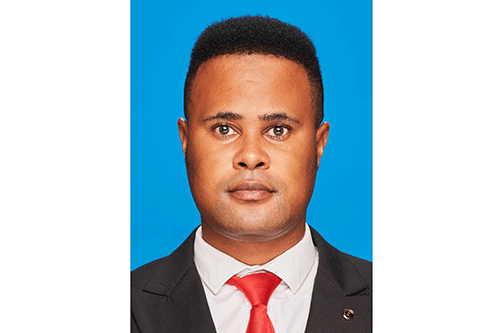Lahja Nashuuta
NORMAN Maurice Nanuseb, a nurse at Khorixas District Hospital, dedicated his career to caring for those who are fragile and frail.
His story highlights the demanding yet fulfilling nature of nursing, underscoring the fact that nursing is indeed an act of heart and a calling.
In an interview with New Era this week, Nanuseb shared the challenges of his role, from exhausting shifts to the emotional impact of patient care.
He was born and bred in Khorixas, and attended Versteende Woud Primary School and Cornelius Goreseb Senior Secondary. Upon the completion of matric, Nanuseb left his hometown to pursue his nursing studies at the Otjiwarongo Regional Training Centre. He is now pursuing a Bachelor of Nursing Science, Clinical Honours Degree at the University of Namibia.
Besides nursing expertise, he possesses additional qualifications in Public Management from the Namibia University of Science and Technology, a certificate in Safety and Health from the Business Management Training College in South Africa, and HIV/ AIDS Management and Counselling from the University of Namibia.
With his comprehensive background in nursing, public management, safety and health, and HIV/AIDS counselling, Nanuseb strongly believes that his diverse skills allowed him to address a wide array of patient needs effectively, and contribute to improving healthcare delivery in his community. “My experience in community work and volunteerism also helps in understanding and addressing the unique challenges faced by different communities, thereby enhancing the department’s outreach and impact,” he noted.
Joining the public service
Nanuseb joined the public service in 2014. Before that, he was deeply involved in community work, volunteerism and youth development programmes through various civil society organisations and NGOs, such as the Namibian Red Cross Society and Pots of Hope.
He also served as the coordinator for the Constituency AIDS Committee at the Khorixas constituency office, and worked as a part-time teacher at several schools in the Khorixas area.
Queried as to what attracted him to the public health sector, Nanuseb said, “I decided to join the public service because I am passionate about community upliftment; coming from a community where most people do not have the means to seek private healthcare.”
“I wanted to serve my people through a public service platform. My goal was to ensure that my first substantive job was back home, where there is no private hospital. Public service allows me to serve the masses, as opposed to the private sector, which is more focused on affordability.”
Nanuseb said working for the government has allowed him to make a significant impact on the lives of people who need it the most, as well as provided him with an opportunity to live his dream of using his expertise to render healthcare assistance to the community.
As a nurse, his day-to-day responsibilities involve caring for patients, their families and the community at large, while protecting and safeguarding their lives.
“I work according to the relevant guidelines of the Ministry of Health and Social Services (MoHSS) and its partners,” he said.
No typical day
Asked what the day in the life of a nurse looks like, he maintained that there is nothing like a typical day for a nurse.
“Every single shift has the potential to be momentous, exhilarating, exhausting, energising, or all the above. On any given day, nurses can see people at their weakest and most vulnerable, or at their strongest and most resolute. They witness the results of career-ending (and life-ending) injuries and illnesses with such regularity that they become par for the course.
It’s almost impossible to portray a typical day for a nurse, given how variable different healthcare workplaces can be, and how work can vary from shift to shift, depending on which patients a nurse needs to see,” he added.
Highs and lows
There is no job without challenges and according to him, “the most challenging and saddest part of my work is seeing someone whom I was just caring for become lifeless, and having to be the bearer of bad news to their loved ones. However, it’s part of the job that must be done.”
He remains a big fan of the efforts and provisions made by the government to provide quality care for Namibians in all corners of the country.
Memorable moments
Queried as to which of his exploits at the workplace is he proudest of, Nanuseb said he successfully coordinated a large vaccination drive in his community, which resulted in high immunisation rates and a significant reduction in preventable diseases.
Another memorable event for which he is grateful to the government is the opportunity he was given to revive a support group for People Living With AIDS (PLWA), which has been instrumental in providing care, counselling and emotional support to those affected.
“These initiatives have not only improved the health outcomes of individuals, but have also strengthened community trust in the public healthcare system,” he said. Having said that, it is clear as daylight that Nanuseb is not planning to leave the civil service anytime soon.
“I will stay and serve for as long as I can to ensure that I continue to grow professionally,” he noted.
-lnashuuta@gmail.com



